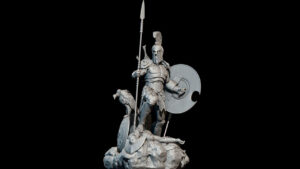Table of Contents
In the realm of Greek mythology, a place of profound significance exists, shrouded in mystery and symbolism – the Lethe River. This ethereal river, along with its enchanting tales, has captivated the human imagination for centuries. In this detailed exploration, we embark on a journey to unravel the secrets of Lethe, delving into its origins, characteristics, visitors, and the captivating myths that enshroud it.
Origins and Significance

The Lethe River, pronounced as “lee-thee,” occupies a prominent role in Greek mythology, particularly within the confines of the underworld, known as Hades. The name “Lethe” itself is laden with meaning, translating to oblivion, forgetfulness, or concealment in classical Greek.
The river derives its name from Lethe, the Greek spirit personifying forgetfulness and oblivion. Lethe is an integral part of the tapestry of Greek mythology, representing the concept of memory and its alteration through the passage into the afterlife.
Location and Characteristics
Lethe flows through the subterranean realm of Hades, meandering through the dimly lit caves of Hypnos, the god of sleep. The entrance to these caves is adorned with poppies and other hypnotic plants, veiling it from the outside world. Once within, neither light nor sound penetrates the depths, casting an eternal shroud of silence.
In its journey through the underworld, the Lethe River borders the realm of Elysium. Elysium, often described as a paradise, is reserved for heroes and mortals who share divine ancestry. It is a place where they lead an immortal life filled with unending happiness.
The rivers of Hades, including Lethe, bear names reflective of the emotions associated with death and the passage into the afterlife. They include Styx, representing hatred; Acheron, symbolizing pain; Cocytus, denoting wailing; Phlegethon, representing fire; and Lethe, the river of forgetfulness.
The Effects of Drinking from Lethe

All souls who traverse the afterlife in Greek mythology must drink from the waters of Lethe. Doing so results in an overwhelming sense of forgetfulness. The sound of Lethe’s murmuring waters induces drowsiness, further enhancing the erasure of memories.
The act of drinking from Lethe serves as a crucial step in the journey of the deceased. It signifies the relinquishment of their past life’s memories, preparing them for the cycle of reincarnation.
The Myth of Er
One of the most captivating accounts involving the Lethe River is found in the “Myth of Er.” Er, a man who died in battle, embarked on a remarkable afterlife journey. His body remained uncorrupted, and he found himself in the company of other souls from the battlefield.
These souls encountered a place with four enigmatic openings, leading either into the sky or into the ground. Judges directed the souls, sending the wicked downward and the virtuous skyward. Er, tasked with observing and reporting, witnessed the contrasting experiences of the souls.
Afterward, the souls arrived at a place adorned by an incandescent rainbow. Each soul received a numbered ticket, and when called, they chose their next life. Remarkably, they all opted for lives opposing their previous existence. Er’s account continues as the souls reach the plane of Oblivion, where Lethe flows.
Each traveler, including Er, had to drink from Lethe, erasing their past lives’ memories and experiences. Er, an exception, had not drunk from the river and retained his memory. His recollection of the journey remained intact when he returned to Earth.
The Mnemosyne River and Orphism

In Greek mythology, an intriguing concept exists alongside Lethe – the Mnemosyne River. Followers of the mystery religion Orphism believed in a choice between two rivers when passing into the afterlife. Drinking from Lethe would result in forgetfulness, while the Mnemosyne River granted the ability to remember everything.
Orphics were dedicated to ending the cycle of transmigration by leading ascetic lives. They believed in the divinity of the human soul and sought to attain omniscience.
Influence on Literature
The Lethe River has left an indelible mark on literature, with notable references in works by poets like Keats and writers such as Dante. Keats’ “Ode to Melancholy” warns against drinking from river, encouraging the remembrance of suffering.
Real Rivers of Forgetfulness
Surprisingly, legends of rivers akin to Lethe exist in real-world locations. The river Limia, between Spain and Portugal, was once thought to induce memory loss similar to Lethe. The Roman General Decimus Junius Brutus debunked this legend, crossing the river to call his soldiers by name.
In Spain, the Guadalete River was initially named the Lethe by Greek and Phoenician colonists. Later, they resolved their disputes by naming it the Lethe, symbolizing forgetfulness, leading to reconciliation.
Conclusion
The River, steeped in Greek mythology and symbolism, offers a captivating journey into the world of memory, oblivion, and rebirth. Its origins in the underworld, its impact on the souls of the deceased, and the vivid accounts of those who traversed its waters have enriched the tapestry of ancient myths. As a symbol of forgetfulness and memory, the Lethe River continues to inspire contemplation, artistic expression, and reflection on the mysteries of life, death, and the afterlife.
FAQ
Where is Lethe located?
Lethe flows through the caves of Hypnos in the Greek underworld, bordering Elysium.
What happens when one drinks from Lethe?
Drinking from Lethe induces forgetfulness and erases memories of one's past life.
What is the "Myth of Er"?
The "Myth of Er" recounts a man's afterlife journey, including encounters with the Lethe River.
What is the Mnemosyne River in relation to Lethe?
The Mnemosyne River offers the choice of remembering everything in the afterlife, contrasting with Lethe's forgetfulness.
How did Lethe influence literature?
Lethe has been referenced in works by poets like Keats and writers like Dante, exploring themes of memory and forgetfulness.
Are there real rivers similar to Lethe?
Some real-world rivers, like the Guadalete in Spain, were once named after Lethe, symbolizing forgetfulness.
What is the significance of Lethe in Greek mythology?
Lethe symbolizes the transition to the afterlife, the erasure of past memories, and the mysteries of memory and oblivion.




